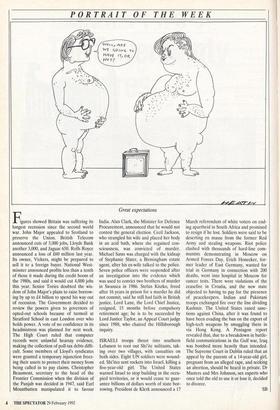PORTRAIT OF THE WEEK
Great expectations
igures showed Britain was suffering its longest recession since the second world war. John Major appealed to Scotland to preserve the Union. British Telecom announced cuts of 3,000 jobs, Lloyds Bank another 3,000, and Jaguar 650. Rolls Royce announced a loss of £60 million last year. Its owner, Vickers, might be prepared to sell it to a foreign buyer. National West- minster announced profits less than a tenth of those it made during the credit boom of the 1980s, and said it would cut 4,000 jobs this year. Senior Tories doubted the wis- dom of John Major's plans to raise borrow- ing by up to £4 billion to spend his way out of recession. The Government decided to review the powers given to governors of opted-out schools because of turmoil at Stratford School in east London over who holds power. A vote of no confidence in its headmistress was planned for next week. The High Court ruled that computer records were unlawful hearsay evidence, making the collection of poll-tax debts diffi- cult. Some members of Lloyd's syndicates were granted a temporary injunction freez- ing their assets to protect their money from being called in to pay claims. Christopher Beaumont, secretary to the head of the Frontier Commission when the division of the Punjab was decided in 1947, said Earl Mountbatten manipulated it to favour India. Alan Clark, the Minister for Defence Procurement, announced that he would not contest the general election. Cecil Jackson, who strangled his wife and placed her body in an acid bath, where she regained con- sciousness, was convicted of murder. Michael Sams was charged with the kidnap of Stephanie Slater, a Birmingham estate agent, after his ex-wife talked to the police. Seven police officers were suspended after an investigation into the evidence which was used to convict two brothers of murder in Swansea in 1986. Stefan Kiszko, freed after 16 years in prison for a murder he did not commit, said he still had faith in British justice. Lord Lane, the Lord Chief Justice, resigned, 15 months before compulsory retirement age; he is to be succeeded by Lord Justice Taylor, an Appeal Court judge since 1988, who chaired the Hillsborough inquiry.
ISRAELI troops thrust into southern Lebanon to root out Shi'ite militants, tak- ing over two villages, with casualties on both sides. Eight UN soldiers were wound- ed. Shi'ites sent rockets into Israel, killing a five-year-old girl. The United States warned Israel to stop building in the occu- pied territories, or it would cease to guar- antee billions of dollars worth of state bor- rowing. President de Klerk announced a 17 March referendum of white voters on end- ing apartheid in South Africa and promised to resign if he lost. Soldiers were said to be deserting en masse from the former Red Army and stealing weapons. Riot police clashed with thousands of hard-line com- munists demonstrating in Moscow on Armed Forces Day. Erich Honecker, for- mer leader of East Germany, wanted for trial in Germany in connection with 200 deaths, went into hospital in Moscow for cancer tests. There were violations of the ceasefire in Croatia, and the new state objected to having to pay for the presence of peacekeepers. Indian and Pakistani troops exchanged fire over the line dividing Kashmir. The United States eased sanc- tions against China, after it was found to have been evading the ban on the export of high-tech weapons by smuggling them in via Hong Kong. A Pentagon report revealed that, due to a breakdown in battle- field communications in the Gulf war, Iraq was bombed more heavily than intended. The Supreme Court in Dublin ruled that an appeal by the parents of a 14-year-old girl, pregnant from an alleged rape, and seeking an abortion, should be heard in private: Dr Masters and Mrs Johnson, sex experts who once told the old to use it or lose it, decided to divorce.
SB


















































 Previous page
Previous page